Note: For 2023 survey data on problems facing the country, read “Inflation, Health Costs, Partisan Cooperation Among the Nation’s Top Problems“
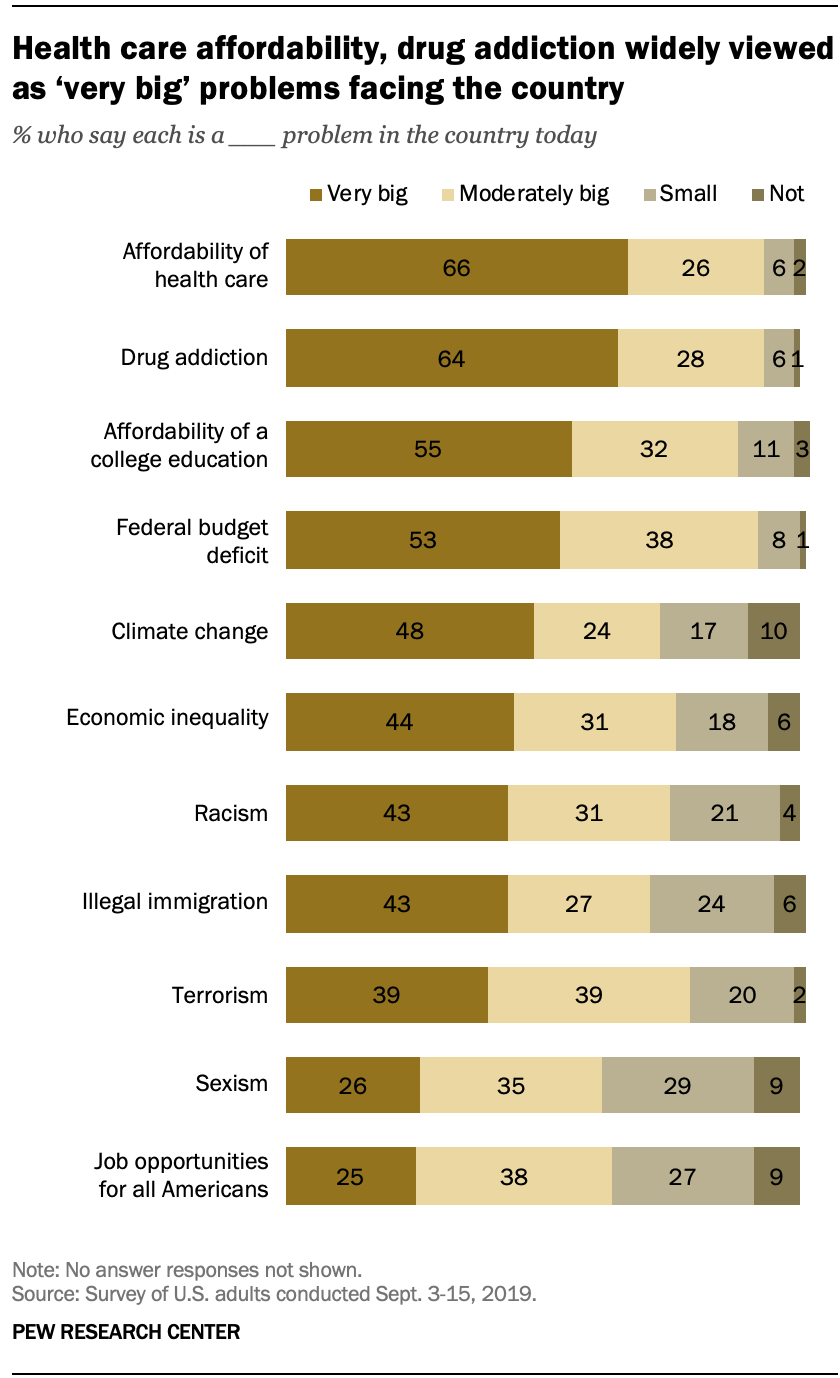
When asked to consider the major problems facing the country, the affordability of health care and drug addiction top the American public’s list.
Other issues, including illegal immigration and climate change, are seen as less pressing, due in part to stark partisan disagreements over the importance of these issues.
Two-thirds of Americans view the affordability of health care as a very big problem for the country today, while another 26% say it is a moderately big problem. Fewer than one-in-ten say affording health care is a small problem (6%) or not a problem at all (2%).
A comparable majority says drug addiction is a major problem: 64% say it is a very big problem in the country and 28% say it is a moderately big problem.
Narrower majorities say the affordability of a college education (55%) and the federal budget deficit (53%) are very big problems in the country. About half say this about climate change (48%).
Somewhat smaller shares of the public cite other issues as very big problems for the country. For instance, 43% say this about illegal immigration and 39% say this about terrorism.
Sexism and job opportunities rank at the bottom of the public’s list of problems in the country. At a time when the public holds positive views of the economy overall, just 25% say job opportunities for all Americans is a very big problem. About the same share (26%) calls sexism a very big problem.
For the most part, assessments of the pressing problems facing the U.S. have not changed a great deal in recent years. However, the shares of Americans who say that terrorism and job opportunities for all Americans are very big problems have declined substantially since November 2016, shortly before the presidential election. At that time, 53% viewed terrorism as a very big problem; today, 39% express this view. And the share who view job opportunities as a very big problem is only about half the level it was three years ago (25% now, 47% then).
Wide partisan differences in views of most major problems
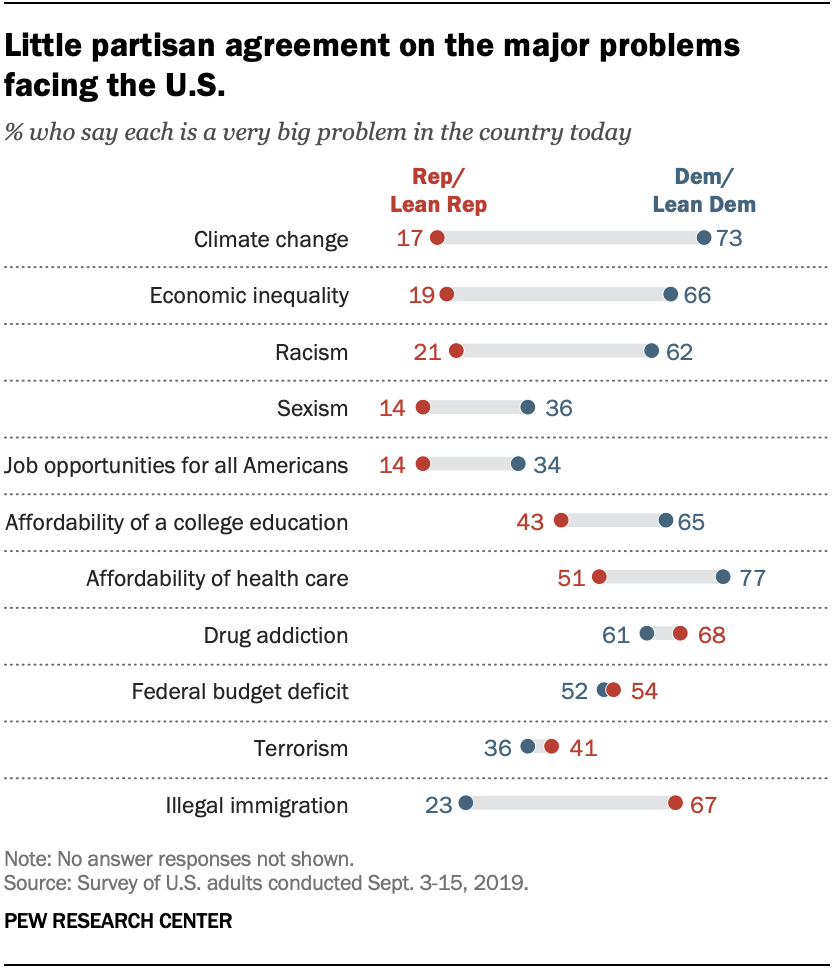
As in the past, there are wide partisan differences on the perceived seriousness of most of the problems asked about in the survey. Democrats and Democratic-leaning independents are far more likely than Republicans and GOP leaners to say several concerns are very big problems – especially climate change, economic inequality and racism.
Majorities of Democrats say all three are very big problems, compared with fewer than a quarter of Republicans. For example, 73% of Democrats say climate change is a very big problem, compared with just 17% of Republicans. (For more on partisanship and views of climate change, see “U.S. Public Views on Climate and Energy.”)
Republicans, by contrast, are more likely to say illegal immigration is a very big problem. Two-thirds of Republicans say illegal immigration is a very big problem; the only problem cited by similar shares of Republicans is drug addiction (68%). Just 23% of Democrats cite illegal immigration as a very big problem, the lowest share for any of the 11 issues included in the survey.
There are a handful of issues that are viewed similarly across partisan lines: Majorities in both parties say drug addiction is a very big problem, though Republicans are more likely than Democrats to express this view (68% vs. 61%). About half of Republicans (54%) and Democrats (52%) say the federal budget deficit is a very big problem. Terrorism ranks relatively low as a concern among Republicans (41%) and Democrats (36%).
Among Democrats and Republicans, there are areas of ideological agreement – and some notable differences – on the severity of problems in the U.S.
On climate change, liberal Democrats (84%) are significantly more likely than conservative and moderate Democrats (64%) to say this is a very big problem. Among Republicans, 28% of moderates and liberals say climate change is a very big problem compared with an even smaller share of conservatives (11%).
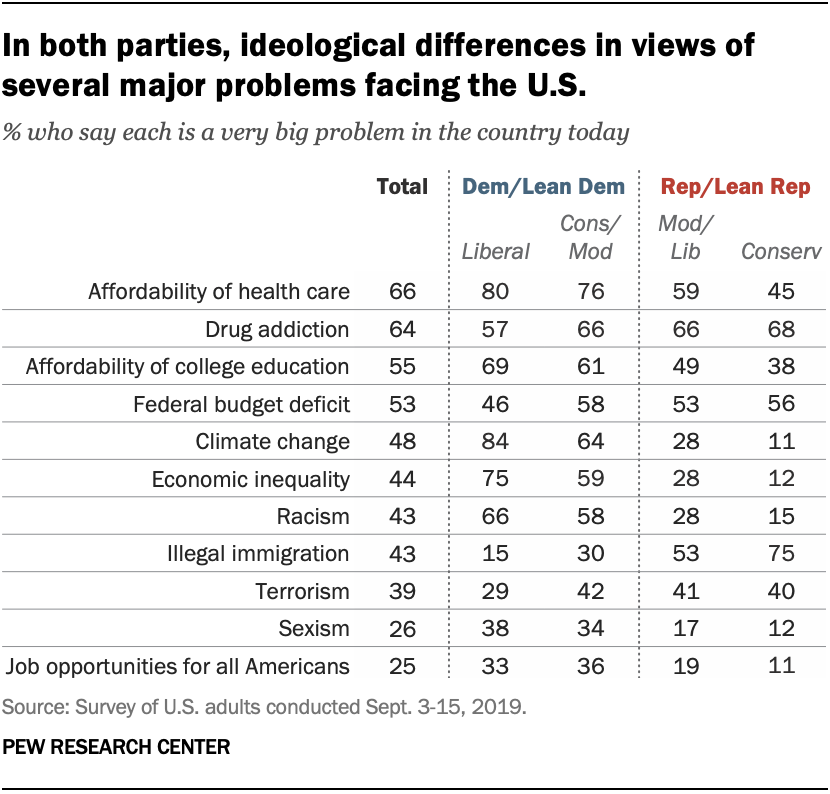
Illegal immigration is the top national problem among conservative Republicans (75% say it is a very big problem), but is viewed as a major problem by fewer moderate and liberal Republicans (53%). Conservative and moderate Democrats are twice as likely as liberal Democrats to say illegal immigration is a very big problem (30% vs. 15%).
Notably, one national concern – drug addiction – is viewed as a very big problem by majorities across the ideological spectrum. Two-thirds of conservative and moderate Democrats (66%) say drug addiction is a very big problem; a smaller majority of liberal Democrats (57%) say the same. Nearly identical shares of conservative Republicans (68%) and moderate and liberal Republicans (66%) say drug addiction is a very big problem.
Age differences in views of the nation’s biggest problems
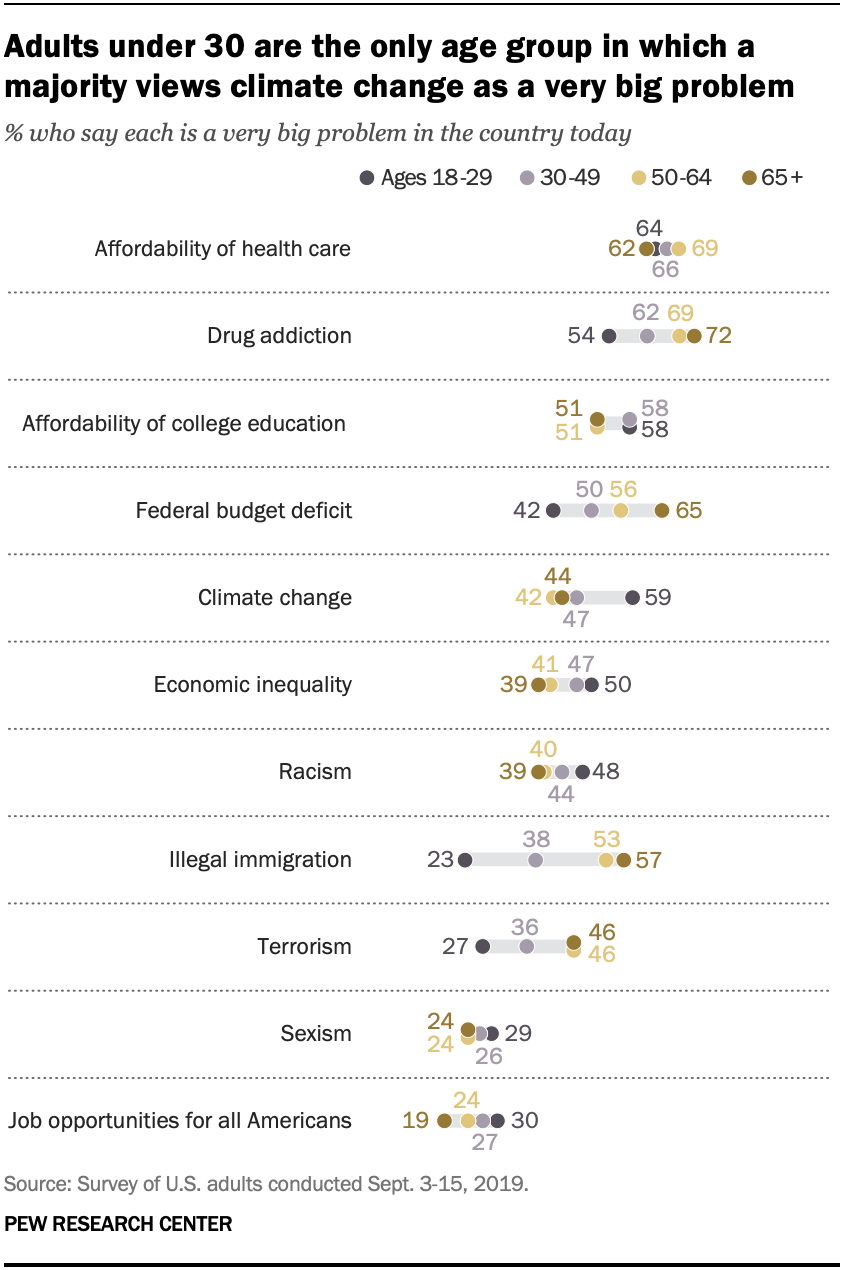
In views of several national problems, the age differences are fairly modest. For example, comparable majorities across age categories say the affordability of health care is a very big problem.
Yet there are notable age differences on such issues as illegal immigration, the federal budget deficit, terrorism and climate change.
On three of these four issues – illegal immigration, the deficit and terrorism – older adults are more likely than young people to regard them as very big problems. For example, 57% of those ages 65 and older and nearly as many ages 50 to 64 (53%) view illegal immigration as a major problem. Fewer than half of those ages 30 to 49 (38%) and only about a quarter of those younger than 30 (23%) say the same.
By contrast, adults under age 30 are the only age group in which a majority (59%) views climate change as a very big problem. Smaller shares of those 30 to 49 (47%), 50 to 64 (42%) and 65 and older (44%) place the same level of importance on the issue.
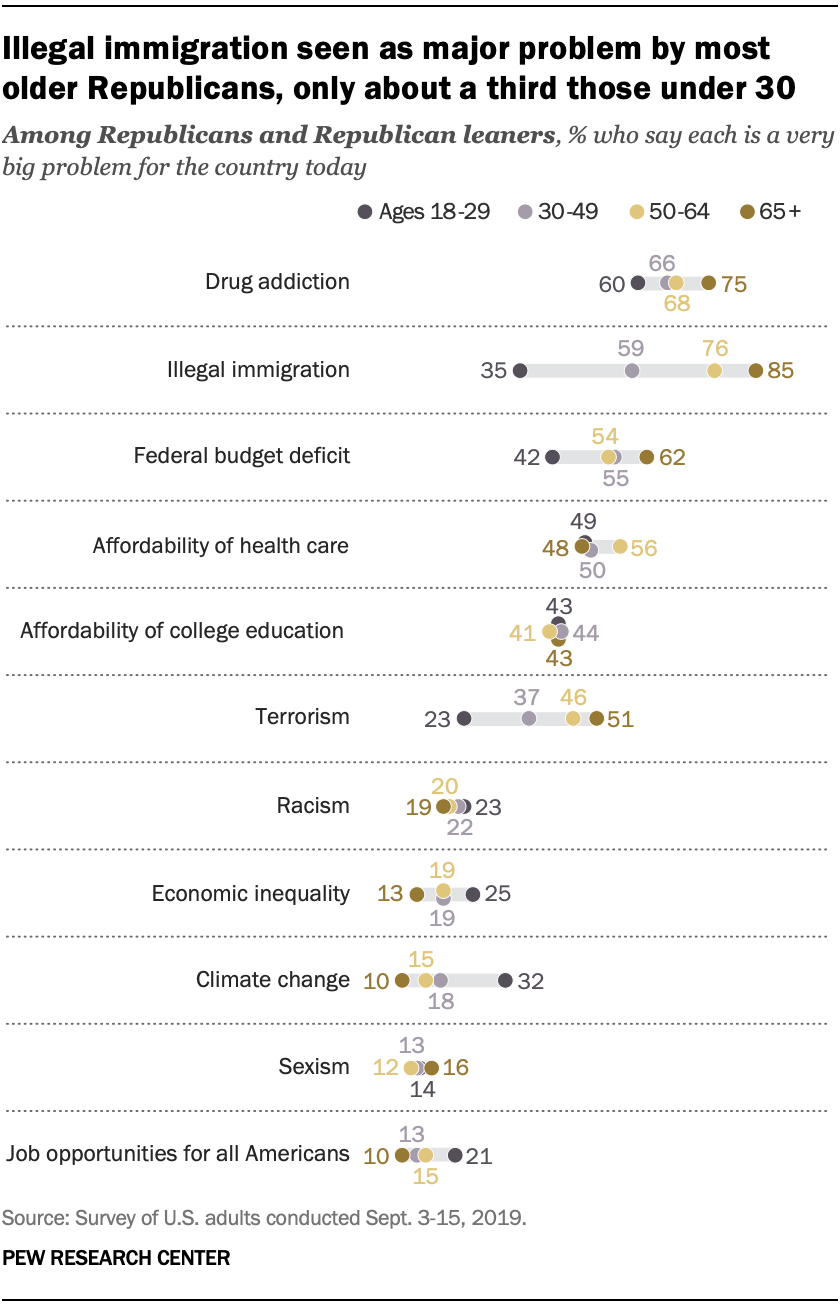
While there are sizable age differences in views of some national problems, these differences are far more pronounced among Republicans and Republican leaners than Democrats and Democratic leaners.
The most striking age gap, by far, in opinions among Republicans is on illegal immigration: Republicans ages 65 and older are 50 percentage points more likely than those younger than 30 to say illegal immigration is a very big problem for the country (85% vs. 35%).
The youngest Republicans also are less likely than older adults in the GOP to say terrorism and the federal budget deficit are very big problems for the country.
On climate change, the age pattern among Republicans runs in the opposite direction. Just 15% of Republicans ages 30 and older say climate change is a very big problem for the country. The youngest Republicans are more likely to see the issue as a very big problem; still, the overall share of young Republicans who say this is relatively modest (32%).
Views of top problems vary by race and ethnicity
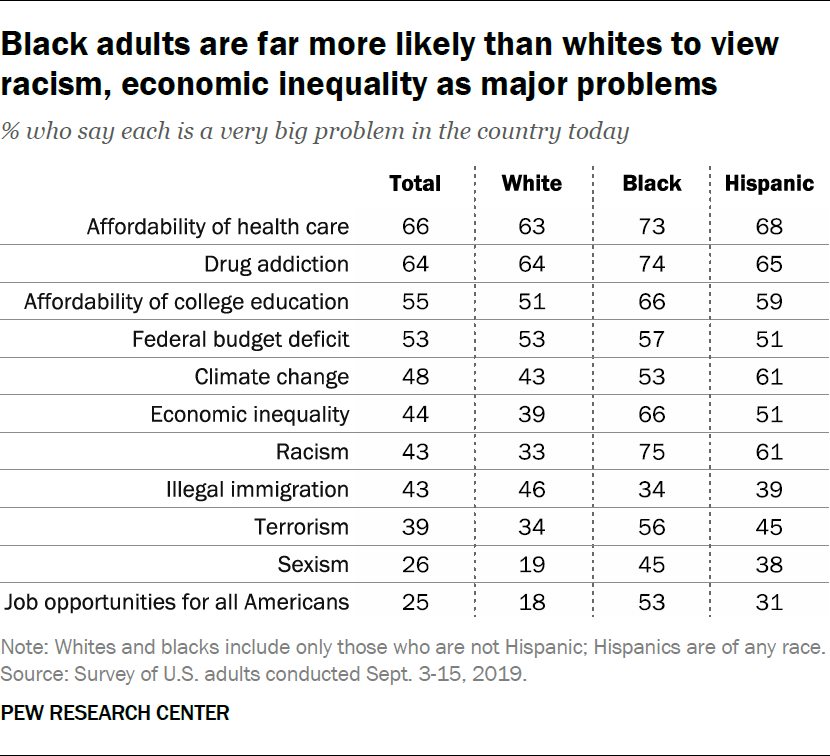
Views of the country’s most pressing problems also differ by race and ethnicity. In general, black and Hispanic adults tend to be more likely than whites to assign high importance to a range of issues.
One of the largest divides in views is over the issue of racism. Majorities of blacks (75%) and Hispanics (61%) view racism as a very big problem in the country today. By contrast, just 33% of whites give the issue the same level of importance.
Two-thirds of blacks (66%) view economic inequality as a very big problem for the country; 51% of Hispanics share this view. Among whites, 39% view economic inequality as a very big problem.
When it comes to job opportunities for all Americans, 53% of black adults say this is a very big problem for the country today, compared with smaller shares of Hispanics (31%) and whites (18%).
Democrats differ by race and ethnicity in their views of some of the major problems in the country. (Differences by race and ethnicity among Republicans were not analyzed due to insufficient sample sizes. Most Republicans and Republican leaners are white; the share of nonwhites in the GOP is far smaller than among Democrats.)

Among Democrats and Democratic leaners, 52% of whites say racism is a very big problem for the country, compared with larger shares of black (79%) and Hispanic (70%) Democrats.
White Democrats are ideologically divided on this issue: While a 60% majority of white liberals say racism is a very big problem, just 41% of white conservative and moderate Democrats say the same.
In addition, black Democrats (52%) are more likely than white (25%) or Hispanic Democrats (37%) to view job opportunities for all Americans as a very big problem.
Economic inequality is viewed as a major problem by nearly identical shares of black and white Democrats (70% and 68% respectively); a somewhat smaller majority of Hispanic Democrats (59%) view inequality as a very big problem. Yet there are wide ideological differences among white Democrats: 78% of white liberals see inequality as a very big problem, compared with 56% of white conservative and moderate Democrats.
Climate change divides Democrats by race and ethnicity, and white Democrats by ideology. Among white and Hispanic Democrats, roughly as many cite climate change as a very big problem for the country as cite the affordability of health care. Among black Democrats, however, 56% say climate change is a very big problem, compared with 79% who say the affordability of health care is a major problem.
Among white Democrats, an overwhelming share of liberals (89%) say climate change is a very big problem for the country. A smaller majority of white conservative and moderate Democrats (69%) say climate change is a major problem for the U.S.




